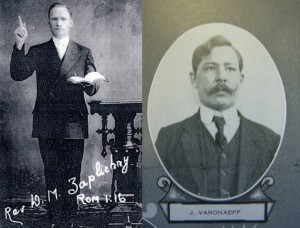95th anniversary of the Pentecostal movement in Bulgaria
 The church in Bulgaria is celebrating the 95th anniversary of its Pentecostal movement in 2015. We were able to participate in this season of celebration and honoring heroes of the faith through a series of lectures and video broadcasts on various topics of Pentecostal history, doctrine and praxis. Additionally, in 2015 we were able to prepare and publish a Bulgarian Prayer New Testament and the Bulgarian translation of Ivan Voronaev’s biography we authored back in 2010. We are thankful to the Lord for this opportunity to minister to the Bulgarian congregation and are looking forward to the Azusa Revival anniversary in 2016.
The church in Bulgaria is celebrating the 95th anniversary of its Pentecostal movement in 2015. We were able to participate in this season of celebration and honoring heroes of the faith through a series of lectures and video broadcasts on various topics of Pentecostal history, doctrine and praxis. Additionally, in 2015 we were able to prepare and publish a Bulgarian Prayer New Testament and the Bulgarian translation of Ivan Voronaev’s biography we authored back in 2010. We are thankful to the Lord for this opportunity to minister to the Bulgarian congregation and are looking forward to the Azusa Revival anniversary in 2016.
Prophetic and Persecuted Movement
![51DUWeyraBL._SY344_PJlook-inside-v2,TopRight,1,0_SH20_BO1,204,203,200_[1]](https://cupandcross.com/wp-content/uploads/2014/04/51DUWeyraBL._SY344_PJlook-inside-v2TopRight10_SH20_BO1204203200_1.jpg) Since a social movement that purposes liberation of the individual is always rejected by the present political and economic powers, Pentecostalism arises and develops in the midst of constant persecution and resistance. The constantly present struggle against evil, wrong and unrighteousness is the power that moves Pentecostalism to its final purposes. Once persecution disappears, Pentecostalism loses its original power and turns to a nominal religious organization, which continues to function and exist, however, outside the boundaries of its original purpose.
Since a social movement that purposes liberation of the individual is always rejected by the present political and economic powers, Pentecostalism arises and develops in the midst of constant persecution and resistance. The constantly present struggle against evil, wrong and unrighteousness is the power that moves Pentecostalism to its final purposes. Once persecution disappears, Pentecostalism loses its original power and turns to a nominal religious organization, which continues to function and exist, however, outside the boundaries of its original purpose.
The theology of the Persecuted Church is a theology of martyrdom. The context of persecution is a constantly present formational factor in Pentecostalism worldwide, and as such it is a universal characteristic of the movement. Only as such can Pentecostalism act in its God-given prophetic authority. In the same prophetic power in which John prophesies of the coming Baptiser with the Holy Spirit, the Early Pentecostals preached about the Fire from Heaven prior to the actual experience of the Holy Spirit baptism. The message of the movement then becomes a prophetic utterance under which the movement grows and develops to the point of fulfillment of the promise given by God.
Movement with a Message
![51DUWeyraBL._SY344_PJlook-inside-v2,TopRight,1,0_SH20_BO1,204,203,200_[1]](https://cupandcross.com/wp-content/uploads/2014/04/51DUWeyraBL._SY344_PJlook-inside-v2TopRight10_SH20_BO1204203200_1.jpg) It is an indisputable fact that the Pentecostal movement has experienced tremendous growth in the twentieth century. Very similar to the ministry of John the Baptist, the message of Pentecost has drawn crowds to the small mountain churches where in contrast to the rather primitive theo-praxis the power of God has been evident.
It is an indisputable fact that the Pentecostal movement has experienced tremendous growth in the twentieth century. Very similar to the ministry of John the Baptist, the message of Pentecost has drawn crowds to the small mountain churches where in contrast to the rather primitive theo-praxis the power of God has been evident.
Similar to the ministry of John, the powerful results of Pentecostalism are produced by preaching that may seem unreasonable. For Pentecostals, however, it is words of life. It is obedience to the Great Commission of Christ to preach the gospel to all due to determination deriving from realized eschatology of the already-not-yet Kingdom of Heaven. The reality of the message then becomes a reality of the Pentecostal community in which the believer lives and witnesses even to the point of martyrdom. What seems to be an unreasonable message to the world becomes the identity of the Pentecostal community.
A loss of the message then means a loss of identity. In order to protect its identity Pentecostalism strives to deliver the message and experience to the generations to come, forming a genuine Pentecostal catechesis. This is much similar to the educational strategy of John the Baptist and his discipleship formation. The restoration and reclamation of the past heritage moves toward preservation of the experience and message. The context of technological and scientific progress, affects the development of the Pentecostal movement transforming its original primitive purpose, theology and practices. The only way to preserve the power of Pentecostalism then is through preservation of its primitivism.







